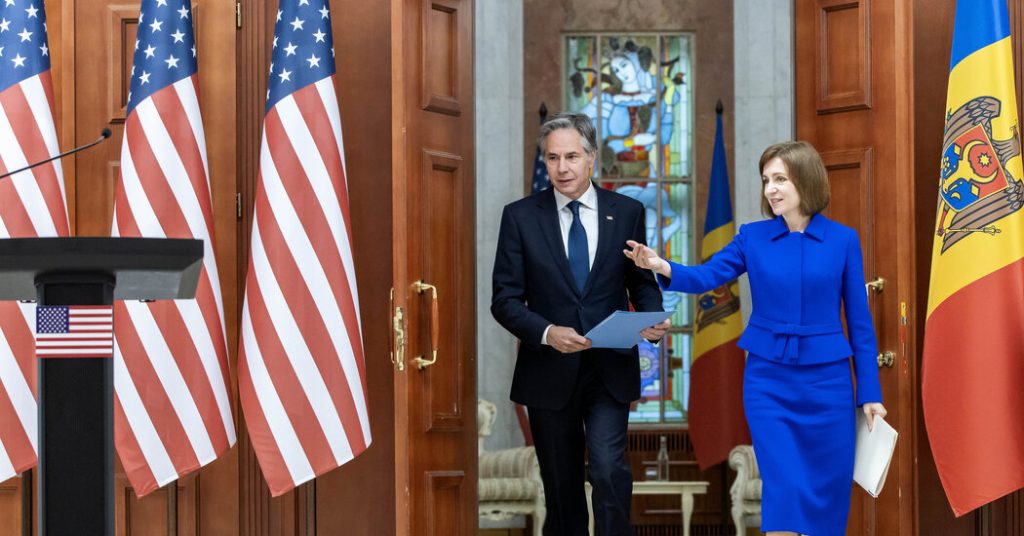Secretary of State Antony J. Blinken mentioned that the Biden administration might be open to supporting strikes by the Ukrainian military inside Russia using American-made weapons based on changing conditions on the battlefield. The United States has not encouraged or enabled such attacks but believes that the Ukrainians should make their own decisions on how to defend themselves. European leaders, including the Secretary General of NATO and the President of France, have called on President Biden to stop imposing limits on Ukraine regarding firing U.S.-made weapons into Russian territory for fear of escalating the war.
During a meeting in Moldova, President Maia Sandu and Mr. Blinken discussed the ongoing crisis in Ukraine and announced new aid packages to address issues arising from Russian aggression. The first $50 million package includes support for Moldova’s industry, government, democratic processes, energy, agriculture sectors, and combating disinformation. The second $85 million package aims to help Moldova increase energy resiliency and reduce dependence on electricity from a Russian-backed separatist region. Mr. Blinken praised Moldova’s commitment to democracy in the face of Russian bullying and highlighted the nation’s shift from natural gas imports from Russia to imports from other countries, including the US.
Mr. Blinken’s visit to Moldova was part of a broader trip aimed at demonstrating U.S. support for countries facing hostility from Russia. He is scheduled to attend a meeting with NATO officials in the Czech Republic to discuss how best to support Ukraine. U.S. and European analysts anticipate Russian interference in Moldova’s upcoming presidential election, with around 1,500 Russian troops stationed in Transnistria, a region bordering Ukraine. The Biden administration has expressed concern about possible Russian interference in the election through various means, including hacking, social media campaigns, and financial support for favored politicians.
As Russian troops continue their offensive in Kharkiv, Ukraine, the Ukrainian military is facing challenges due to a shortage of weapons and munitions, as well as a decrease in the number of citizens able to join the fight. President Biden recently signed a bill granting new military aid to Ukraine, despite some opposition from Republicans. Russia’s military industrial capabilities have not been significantly impacted by U.S.-led sanctions, with China playing a key role in supporting Russia through exports of dual-use equipment and other goods that have strengthened its weapons production. Mr. Blinken is expected to address China’s support for Russia in discussions at the NATO meeting in Prague.
The NATO meeting in the Czech Republic aims to set the agenda for the upcoming 80th-anniversary meeting of alliance leaders in Washington in July. While Ukraine’s potential membership in NATO is not expected to be declared, discussions will focus on advancing the process of joining the alliance. U.S. officials are closely monitoring developments in Transnistria to detect any signs of potential Russian annexation. The recent Russian offensive in Kharkiv has highlighted the urgent need for international support to bolster Ukraine’s defense capabilities and resilience against ongoing aggression from Russia.
In conclusion, Secretary of State Antony J. Blinken’s visit to Moldova and subsequent attendance at the NATO meeting in the Czech Republic underscore U.S. support for countries facing aggression from Russia, particularly Ukraine. The Biden administration is considering potential flexibility in supporting strikes by the Ukrainian military inside Russia using American-made weapons, based on evolving battlefield conditions. Efforts to provide aid to Moldova to address Russian aggression, enhance energy resiliency, and combat interference in the upcoming presidential election are central to U.S. foreign policy priorities in the region. The ongoing conflict in Ukraine, challenges faced by the Ukrainian military, and concerns about Russian interference in Moldova highlight the complex geopolitical dynamics at play and the need for coordinated international responses to address threats emanating from Russia and its allies.


